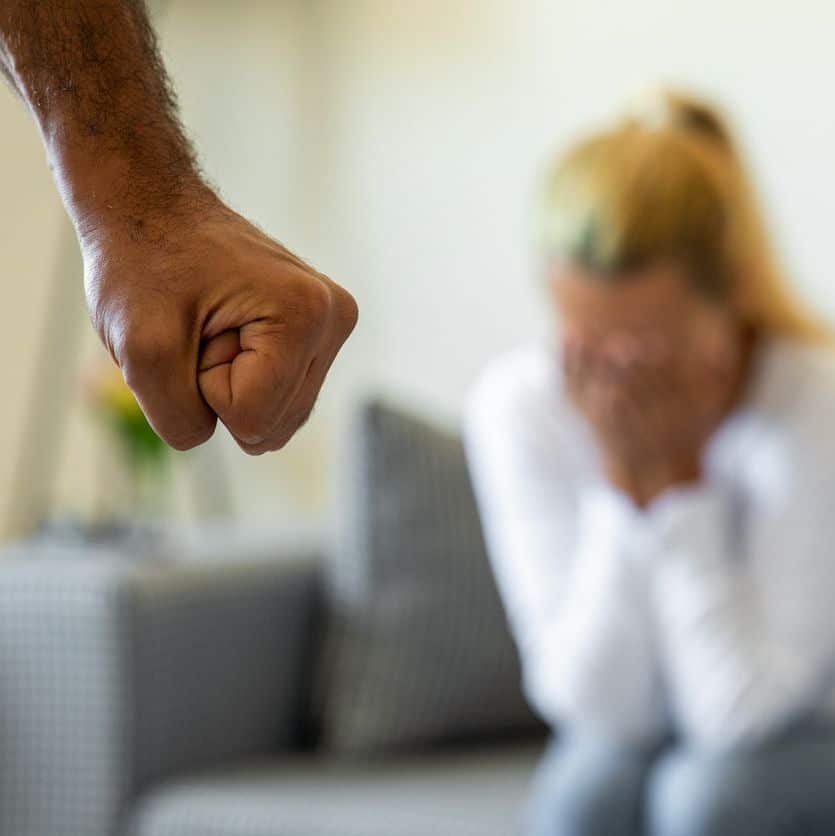Domestic violence charges are common in Indiana, and the consequences severe if you are convicted. At minimum, you face up to a year in jail for a domestic battery conviction and a fine up to $5,000. Additionally, you will be saddled with a permanent criminal record.
There’s no time to delay. You need immediate legal advice because the prosecutor will dedicate ample time and resources to convict on domestic violence cases. Contact the proven Indianapolis domestic violence lawyers at Gemma & Karimi, LLP, for immediate legal assistance at (317) 602-5970. Our attorneys have 25 years of distinguished experience and are available 24/7 for consultations.
Understanding Domestic Battery
Domestic violence is referred to as domestic battery under Indiana Code 35-42-2-1.3. This statute states that domestic violence involves a person knowingly or intentionally touching a household member or family member in a rude, insolent, or angry way. It is also in a rude, insolent, or angry manner, placing any bodily waste or fluid on a household or family member. It is also causing any physical injury to a family or household member.
This serious domestic violence crime involves a family or household member, such as spouses, former spouses, dating partners, former dating partners, people who have had children together, or those related by blood or adoption who reside together or have resided together.


Facing criminal charges in Indianapolis?
Call our Indiana Criminal Defense attorney at (317) 602-5970 or fill out our online contact form today to schedule a free consultation!
Domestic Violence Offenses in Indiana
A domestic violence or battery offense in Indiana can include a variety of violent or aggressive offenses, such as:
- Criminal confinement
- Harassment
- Criminal stalking
- Criminal trespassing
- Invasion of privacy
- Kidnapping
- Neglect and abuse
- Violation of a protection order.
These serious criminal offenses can lead to separate criminal penalties upon conviction. Domestic violence crimes can be charged as felonies or misdemeanors, depending on the severity of the offense, as well as any aggravating or mitigating factors. However, strong defenses are available, such as self defense and lack of intent.

Penalties for Domestic Battery
The penalties for domestic violence in Indiana depend on the offense circumstances, including the severity of the crime, status of the victim, and criminal history. Potential penalties for this crime are as follows:
Misdemeanor Domestic Battery
- Class A misdemeanor: Domestic violence is charged as a misdemeanor if there are no aggravating factors. Penalty is up to a year in jail and a maximum $5,000 fine. Examples: Slapping, shoving, or other aggressive touching that doesn’t cause major injury.
Felony Domestic Battery
- Level 6 felony: If you have a prior conviction for battery or strangulation; the offense happened in the presence of a minor; caused moderate bodily injury; the victim was under 14 or has a mental or physical disability. Penalty is six months to 2.5 years in prison, and a maximum fine of $10,000.
- Level 5 felony: If you have a previous battery conviction against the same person. Or, the crime caused a bodily injury to a person who is under 14, has a mental or physical disability, or is an endangered adult. Penalty is one to six years in prison, and a fine up to $10,000.
- Level 4 felony: Applies if the crime caused a serious bodily injury, disfigurement, or long-term impairment to an endangered person. Penalty is two to 12 years in prison and a fine up to $10,000.
- Level 3 felony: If the offense caused a serious injury to someone under 14. Penalty is three to 16 years in prison and a $10,000 fine.
- Level 2 felony: If the battery causes death to someone under 14 or an endangered adult. Penalty is 10 to 30 years in prison and a fine of $10,000.
Additional Domestic Battery Consequences
- Intervention programs: The court may order the defendant to complete a batterer’s intervention program.
- A conviction may lead to a loss of gun rights, difficulty finding a job or housing, and social stigma.
- The victim may ask for a civil protective order. Violation of such an order can lead to additional charges for invasion of privacy, etc.
Defending Against Domestic Battery Charges
Defending against an Indianapolis domestic violence charge is complex, but experienced domestic violence attorneys excel in this work. Your Indianapolis domestic violence attorney may employ one or more of these strategies:
- Self-defense: Defending yourself from another person is the most common defense to a domestic battery charge. You could be justified in your actions if you acted to protect yourself or another person from harm. Indiana is a Stand Your Ground state, meaning you aren’t required to retreat if threatened with harm. A self-defense defense in a domestic violence case can be corroborated with eyewitness statements, your medical report with injuries, or previous threats from the alleged victim.
- No intent: A domestic violence conviction requires proving intent. If your contact was accidental, you can argue you did not have intent. For instance, if you accidentally bumped someone in an argument, there was no intent to cause harm.
- False accusation: A domestic violence allegation could stem from revenge, misunderstandings, or custody and divorce disputes. You may support this defense by providing text messages, phone recordings, videos, or inconsistent statements from the alleged victim.
- Lack of evidence: The prosecutor must prove beyond a reasonable doubt that you engaged in domestic violence. If there is no physical evidence or witnesses, a domestic violence conviction is difficult.
- Consent: Occasionally, if the contact happened because of consensual activity, such as wrestling, this is a possible defense.
Immediately contact the Indianapolis domestic violence attorney at Gemma & Karimi, LLP, to begin building a robust defense to your domestic violence charges. You should not speak to the police without having your criminal defense attorneys present. Keep in mind that a no-contact order could be issued, which prohibits you from contacting the alleged victim.
Frequently Asked Questions
Being charged with domestic battery is alarming and a serious matter. You probably have many questions, so we provide the most common questions and answers below. Speak to our criminal defense attorneys immediately for additional information.
Domestic battery is different from regular battery because of the personal relationship between the defendant and alleged victim. There are also some differences in how the crimes are defined and charged. Regular battery in Indiana is touching another person in a rude, insolent, and angry manner, possibly causing injury. Domestic battery involves the same actions but involving a family or household member.
No. The alleged victim cannot drop the domestic violence charges after they are filed. Once you report a domestic violence incident, the case is between the state and defendant. The state prosecutor represents the state and will decide whether to pursue or dismiss the charges.
That said, the alleged victim can influence out case outcome with their victim’s statement and refusing to cooperate. Talk to your domestic violence lawyers about your legal options if you have changed your mind about the charges.
Yes, a domestic violence conviction can affect your child custody rights. State courts prioritize the best interests of the child when deciding custody cases. A domestic battery conviction is a significant factor that could risk the child’s safety. A conviction could lead to the court ordering that your parenting time be supervised, and a loss or limitation of custody is possible. Thus, you must retain a skilled criminal defense attorney to defend your rights.
Yes. You can be charged with domestic battery without causing injury. Domestic battery in Indiana is defined as intentionally or knowingly touching a household or family member in an angry, rude, or insolent manner. So, the mere act of touching may be sufficient for a domestic battery conviction. Physical harm is not required.
First, stay calm and do not attempt to contact the alleged victim. A no-contact order may be issued, and violating it is a serious matter that leads to invasion of privacy and other charges.
Second, document everything, including a detailed description of what happened, when, where, what was said, and what happened. Collect evidence that supports your case, including texts, voicemails, emails, and social media posts.
Third, retain an experienced criminal defense lawyer immediately. A skilled attorney will assess your case, pinpoint weaknesses in the state’s evidence, and construct a strong defense.
Your criminal defense attorney understands Indiana domestic battery laws and will explain how they apply to your case. They will also review your case details and evidence to find any weaknesses in the prosecutor’s case. Lastly, they will devise a robust defense strategy, such as self-defense, lack of intent, or false allegations.
The timeline for your case depends on the complexity of the matter, the court schedule, and whether a plea agreement is reached, or the case goes to trial. Misdemeanor cases usually are resolved faster than felony cases. Indianapolis courts tend to be busier, while rural counties may process cases faster.
Yes, a domestic battery charge might be expunged, but it depends on the case details. You could qualify to expunge the arrest record if you were arrested but not convicted. You usually need to wait a year from the arrest date. If you were convicted, you could qualify for expungement, but the waiting period is five years for a misdemeanor conviction and eight years for felony convictions for domestic battery.
Contact Our Indiana Domestic Violence Attorneys
Were you charged with domestic violence in Indiana recently? This is a scary, uncertain time. A domestic violence conviction could lead to jail time, fines, and a permanent criminal record that imperils your future. But there’s hope.
Our seasoned Indianapolis domestic violence lawyers at Gemma & Karimi, LLP, have successfully defended men and women from misdemeanor and felony domestic violence charges. We possess a strong track record of defending people like you from domestic battery charges. Our domestic violence attorneys understand the complexities of domestic violence laws and can assist you with navigating the criminal justice system. Contact our Indianapolis domestic violence defense attorney now at (317) 602-5970 for a legal consultation.

Contact Our Firm
Interested in our services? Fill out some info and we will be in touch shortly. We can’t wait to hear from you!
